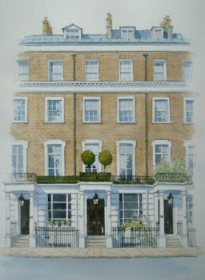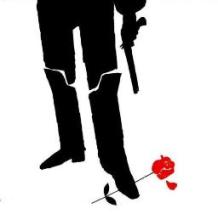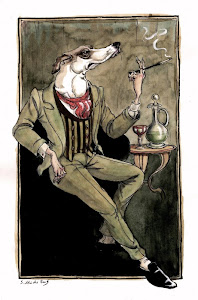 The allure of the double-breasted jacket is that it has always had an unaccountable dash and romantic aura about it. It possesses an undeniable jauntiness, which is the reason dandies have always favoured it. Victoria's consort, Prince Albert, gave his interest and his name to a version: a short-waisted, double-breasted frock coat that he was particularly fond of wearing (although it must be admitted that Albert, clothes-horse that he was, was fond of wearing everything from bright tweed knickers to suits of armour). And the Edwardian dandies--Max Beerbohm, Oscar Wilde, and of course Edward VII himself--were addicted to their double-breasted velvet smoking jackets, broadcloth morning suits, worsted barathea frock coats, and even boldly checked double-breasted tweed lounge suits--often worn with matching tweed spats and golf cap.
The allure of the double-breasted jacket is that it has always had an unaccountable dash and romantic aura about it. It possesses an undeniable jauntiness, which is the reason dandies have always favoured it. Victoria's consort, Prince Albert, gave his interest and his name to a version: a short-waisted, double-breasted frock coat that he was particularly fond of wearing (although it must be admitted that Albert, clothes-horse that he was, was fond of wearing everything from bright tweed knickers to suits of armour). And the Edwardian dandies--Max Beerbohm, Oscar Wilde, and of course Edward VII himself--were addicted to their double-breasted velvet smoking jackets, broadcloth morning suits, worsted barathea frock coats, and even boldly checked double-breasted tweed lounge suits--often worn with matching tweed spats and golf cap.However, the great age of the double-breasted suit did not arrive until the 1930s, when the sartorially resplendent likes of the then Prince of Wales, Louis Mountbatten, Fred Astaire, Douglas Fairbanks, Cary Grant, and Jimmy Walker took it as their uniform. Whether in sporty brown glenurquhart plaid, chalk-striped oxford-grey flannel, or the dressier navy worsted, the double-breasted suit with its long-roll, low-buttoned peak lapels, full shoulder and chest, and bladed back made every man an elegant boulevardier. The English-cut double-breasted "blade" suit, perhaps better than any other masculine garment, defined the years between the wars.
- G. Bruce Boyer, Elegance (1985)





















2 comments:
"The English-cut double-breasted "blade" suit, perhaps better than any other masculine garment, defined the years between the wars."
I won a beautiful 1940s specimen on Ebay years ago. Dashing jauntiness ensued.
Admiral, I always take a man in a double breasted suit more seriously. Dashing jauntiness notwithstanding.
Post a Comment